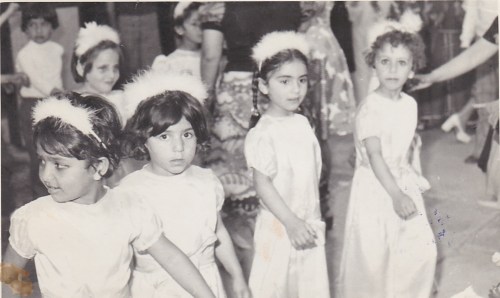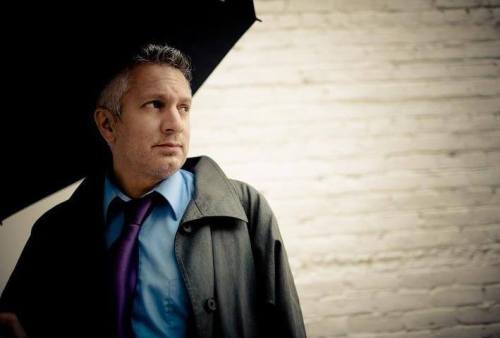Baghdad, the Gift of God

They say that Baghdad means the “gift of God” in Persian. That definition reflects the memory I have of my birth country, not the news, which is saturated with accounts of prolific violence and a reign of terror. Instead, I visit that place, the past, which contains flavors of a happy childhood, of magic and mystery.
In the 1970s, children in Baghdad owned the streets during the hours when they were not in school. We were like the train gate in control of traffic. When a car drove by, we scattered left and right to make way, and once the car passed, we resumed to jump rope, hopscotch, tag, hide-and-go-seek, and play the all-time favorite game of marbles, where we drew a circle on the ground with a stick, placed all the marbles in the circle, then shot their smooth and brightly colored glass sphere to knock the other marbles out of the circle.
We did not worry about thieves or kidnappers because the majority of mothers stayed at home and watched the children, theirs and the whole neighborhoods’, as if they had binoculars implanted on all sides of their heads.
We didn’t have toys, board games, or electronic games. Television programming started at 6:00 pm, opening up with Quranic prayers, then children’s shows, followed by regular family programming, and the news. By midnight, the screen would go dark and then the colored bars came on, followed by the pink noise and static-filled screen. In the summer, two additional hours were added in the morning to get the kids out of their mother’s hair.
Our district was our amusement park.
We didn’t need waterslides, merry-go-rounds, Ferris wheels, roller coasters, cotton candy, popcorn, or lemonade. We just had a simple desire to be together, and to be creative.
Once the early morning winter frosts had given way to spring, the wild flowers and fruit trees sprouted over the land the way in which brown and yellow grass turned green here in America. There are more than 3,300 plants and flowers in Iraq. The scent of palm trees, fig trees, citrus trees, berries, Jasmine, sunflowers, and roses – the national flower of Iraq and the United States – is enough to cure ailments and feed the soul before their parts are removed and used for food or traditional medicine.
In the summer, our bedrooms were dismantled and our pillows, bed sheets, and blankets were carried to the rooftop, where they were set up in rows so we could sleep under an open sky. The rooftop was a real entertainment.
During broad daylight, we would go to the rooftop and watch the man in a white tank top smoke, his arms resting over the roofless wall; a woman hang bed sheets, pajamas, nightgowns, and men’s tank tops and pants on a clothesline; our neighbor’s older sister hold up a mirror in a well-lit corner as she plucked her eyebrows; a young student across the street who liked to pace back and forth while reading his book.
In the falling twilight we would crawl out of our beds on the rooftops to chase after the moon that changed direction whenever we changed direction. We’d stand on top of the beds, raise our voice, and call out to our friends next door, asking them, “What are you doing?” Or we argued about who the moon was actually following, us or them, until our mothers would hush us up and scuttle us back to bed. Lovers had their own secret way of utilizing the rooftop, which we were then too young to learn the details of.
Every July 14, we watched the fireworks celebrating the 1958 revolution that took place in Iraq, marking the overthrow of the Hashemite monarchy established by King Faisal in 1932 under the support of the British. One July 14, as we competed with the neighbors across our roof, we screamed so loud and jumped so hard that the bed broke and we fell through to the ground. The neighbors laughed hysterically and we got up, all red-faced.
Long before that, Baghdad was the center of learning and commerce where the House of Wisdom was built. The House of Wisdom, was a key institution in the translation movement where Greek, Persian, Sanskrit, Chinese, and Syriac works were translated into Arabic and the concept of the library catalog was introduced. When the Mongol invaded Iraq in 1258, they destroyed the House of Wisdom, along with all other libraries in Baghdad, and that has become the story of Iraq’s life.
My family left Iraq when I was nine years old, and I didn’t visit that land until 20 years later. I spent Easter of 2000 in Baghdad, church hopping and eating pacha with relatives. I visited my parents’ and grandparents’ village of Telkaif in Mosul, and slept on the rooftop under the star filled night. Iraq was not the same as I remembered it, but I still had a lovely time.
This article was originally published by Arab America http://www.arabamerica.com/baghdad-gift-god/#.WO5FxRMpPxw.facebook

